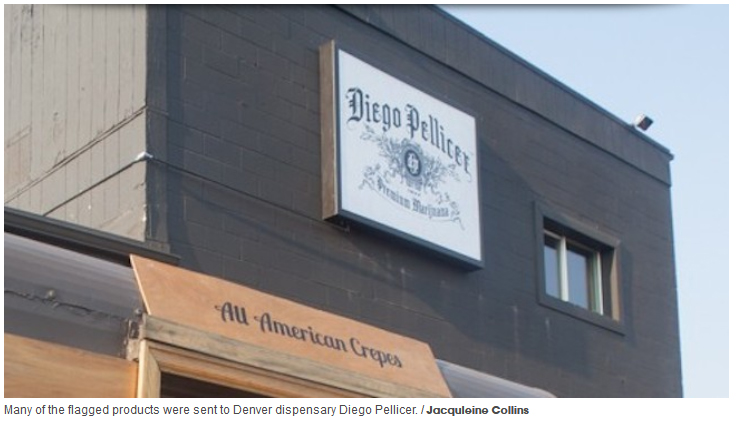By: Thomas Mitchell
December 11, 2019
Click here to read the original article at www.westword.com
 Another mold and yeast recall has hit Denver's marijuana business. The contamination level in this recall measures thousands of times the state's limit, highlighting a growing concern for the commercial pot industry.
Another mold and yeast recall has hit Denver's marijuana business. The contamination level in this recall measures thousands of times the state's limit, highlighting a growing concern for the commercial pot industry.
According to the city's Department of Public Health and Environment, marijuana plant material and pre-rolled joints from wholesale grower Royal Resin tested positive for potential dangerous mold and yeast levels. The flagged weed had been sent to six different dispensaries, with most of it going to Diego Pellicer at 2949 West Alameda Avenue.
Potentially contaminated marijuana products were also sent to Greenfields (1798 West Mississippi Avenue), The Herbal Center at Peoria Crossing (12005 East 37th Avenue), Altitude's Aurora (10455 East Colfax Avenue, Aurora) and West (1568 South Federal Boulevard) locations, and two Starbuds stores, at 4690 Brighton Boulevard and 1451 Cortez Street. The OPC codes listed on the affected products are 403R-00651 and 403R-00691.
The test results that led to the recall indicate some of the highest levels of yeast and mold found by the DDPHE so far, with lab tests for samples of one strain, Lemon Cookies, containing 39 million yeast and mold colony-forming units per gram — or 3,900 times the state's limit for total yeast and mold in marijuana plant matter.
These contaminants can be difficult to spot, DDPHE investigators note, and aren't always visible. In fact, none of the mold and yeast identified in Royal Resin's recent lab tests was detectable by the naked eye during early investigations, according to the DDPHE. The plant matter also went through state contaminant testing shortly after harvest and before it arrived at dispensaries.
"This isn't powdery mildew, which is very easy to spot. There are definitely situations where it won't be visible to the naked eye," explains Danica Lee, head of DDPHE public health inspections. "A challenge in this is the lack of homogeneity. You can sew samples from the same [strain batch] that have different samples for microbial loads. We're trying to search for proximity — if it happens in the same part of the room — or if it's a specific plant. That's the stuff we're trying to find correlations on."
Lee says that Royal Resin has been cooperative during the investigation, and has been assertive in trying to remediate the issue.
The Royal Resin recall is one of a handful of mold recalls to hit Colorado's pot industry over the last two years, as wholesale growing operations face increased scrutiny from health inspectors and regulators. In October, wholesale provider Bonsai Cultivation issued a statewide recall over mold worries, while the state Marijuana Enforcement Division recalled potential contaminated pot from nine dispensaries across Colorado last month, after an MED tracking error accidentally released quarantined marijuana that had previously failed state testing.
This fall, Westword studied DDPHE investigation reports for tests conducted at 25 dispensaries over a two-day period in September. At twenty of them, marijuana products tested over the state's limit for total mold and yeast, an 80 percent failure rate. The tests were part of a random assessment conducted by the DDPHE to take the pulse of dispensaries' product handling; a report on those tests will be released within the next three to four months, according to Lee.
In the meantime, Lee says, DDPHE marijuana inspectors are trying to learn as much as they can about marijuana's production process to identify potential weak links.
Click here to continue reading the full article at Westword.com

